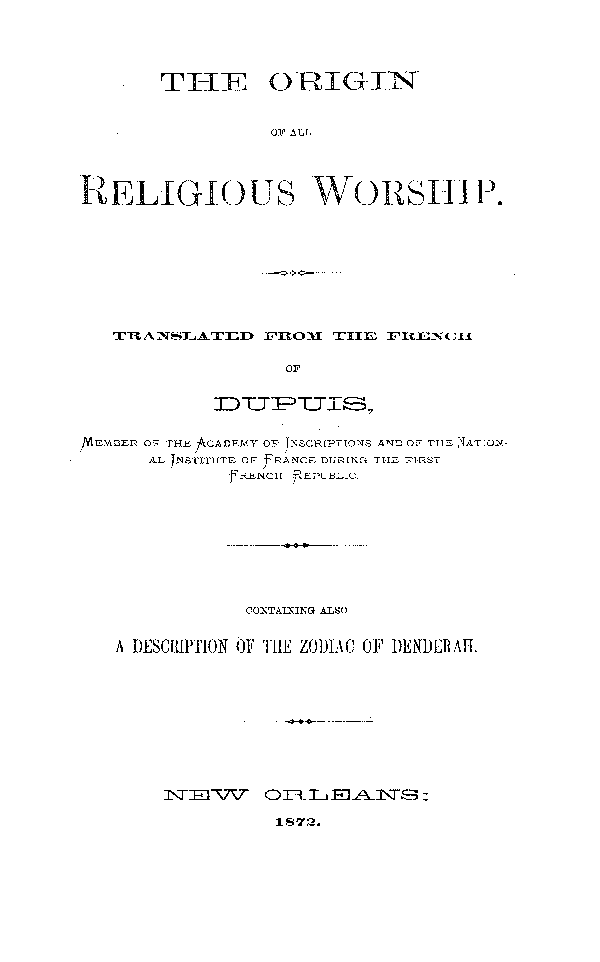THE ORIGIN OF ALL RELIGIOUS WORSHIP
DUPUIS
Google Book Search
This is a digital copy of a book that was preserved for generations on library shelves before it was carefully scanned by Google as part of a project to make the world's books discoverable online. See the back of the book for detailed information.
PREFACE OF THE AUTHOR.
Many persons having desired, that I should give to the public an abridgment of my larger work on the origin of religious Worship, I have concluded not to delay any longer their expectations. I have therefore condensed the work in such a manner as to present the substance of the principles on which my theory is established, and to give an extract of its most important results, without dwelling much on particulars, which may always be found in the larger edition.
This synopsis will be found useful even by those who should possess the first, because it will serve as a guide in the study of many volumes, which on account of the nature of the work, places the ordinary reader beyond the circle of learning usually required, in order to read with profit, and without great effort, a work of erudition. They will find there a succinct result of their studies and precisely that which is desirable to be retained in the mind of those who do not wish to give themselves up entirely to the profound study of antiquity, and yet still desire to become acquainted with its religious spirit. As for those who have not access to the larger edition, they will find in this abridgment an extract of the principles of the new system of explanations and a sufficiently detailed account of the discoveries to which "it has led, as also an idea of those more remote consequences which may result to those, who shall pursue still further the study of antiquity on this newly opened route.
It will thus offer to both new ideas, which are not in the larger work. I have divested it, as much as the subject allowed, of that learned matter, which would involve an unusual erudition, in order to place it within the reach of the greatest number of readers possible, because the instruction and the happiness of my fellow men has been and shall always be the object of my labors,
PREFACE OF THE TRANSLATOR.
In presenting this translation of the philosophical work of Dupuis, to an intelligent American Public, the translator, while doubting the adequacy of his labors, still hopes, that the difficulties inherent in such a task, will be properly appreciated, in as much as elegance of style and conciseness are apt to suffer, when a strict adherence to the sense of the author is aimed at.
For the proper understanding of certain chapters in this work, a somewhat classical education will be required. Its pages were destined for the lover of wisdom, for the friend of humanity and truth. Written during the stormy times of the first French Revolution, its object was evidently to expose the corrupting tendencies of Catholicism in France. The attentive reader will admire the prophetic words of the author, with regard to its future state of society; his profound crudition and his exuberant store of historical knowledge of antiquity, exhibited in his explanations of all religious systems, but especially of that of the Christian dogma in the shape of Catholicity. Stripping it of all its ancient drapery and finery, he fearlessly plants the torchlight of reason and history into the midst of the Dome of St. Peter, and from its glare all the phantoms of superstition and traditional imposition seem to vanish like the shades of night before the rising sun. If the" foundations of the whole edifice of this dogma are thereby materially impaired, it is that science and truth are no respector of creeds or persons, and like the sun will shine on the just and the unjust.
The learned author's novel and peculiar system of explanations leads the attentive reader imperceptibly to startling revelations, which, while instructive and replete with interesting details, are undoubtedly coming into conflict with old established ideas and preconceived notions. In this the im
partial reader must be his own judge. We, however, fully agree with the author, when he exclaims, as it were'in despair : "That it would appear almost an act of folly , in pretend ing to uproot that ancient Upas - tree of religious superstition , under the poisonous shade of which mankind has been for ages accustomed to repose , and the roots of which are so wide - spread and profound . "
In this age of refined hypocrisy, how can such a work be expected to please? There will be many, unable to shake of their ancient prejudices, their fetters of anti - natural education, and others, who, while fully concturing in their hearts with the voice of Reason and Nature, yet cannot divest themselves of the idea, that some sort of deceit is necessary, in order to maintain the standard of morality in society. Unfortunately, there seems to be some reason for it, as long as Fiction , Su pernaturalism and Deceit shall be made the basis of moral education instead of Truth and Nature. There cannot be
any doubt, with a thorough reform of all educational systems on that basis, an improved standard of morality would be the natural consequence.
MEMOIR
ON THE LIFE AND WRITINGS OF DUPUIS; EXTRACTED AND TRANSLATED

Dupuis (Charles Francois) was born at Trie - le - Chateau , near Chaumont , in the Department of Oise, in France, on the 16th October, 1742, of honest, but poor parents. He was taught mathematics and surveying by his father, who was a teacher, and at the early age of six he already wrote a very good hand, so much so, that it could serve as a model. His parents having removed to La Roche Guyon , in the Department of Seine and Oise , he was occupied one day on the shore of the Seine to take with a graphometer the height of the steeple of that town. During that occupation the young Geometrician, who was then not more than twelve years old, was observed by the Duke de la Rochefoucault who seemed to be destined to become the protector and friend of the men of merit and talent of his time, and to whose friendship or favor we owe perhaps the accession to science of the celebrated Dolomieu . The Duke accosted the youth, and being highly pleased with his answers to his questions, he placed him with the authorisation of his parents, at the college of Harcourt , where he endowed him with a scholarship. The illustrious protector was very soon recompensed for his benevolence by the rapid progress of his protg , who at the age of twenty-four was installed as professor of Rhetoric at the college of Lisieux. During the leisure hours left him by the duties of his office, Dupuis studied law, and was received as an advocate in 1770 at the Parliament of Paris. At about that time he quitted the ecclesiastical dress, which he had worn until then, and married. In 1775 he was charged with the composition of the latin oration for the distribution of the prizes of the University. The Parliament of Paris had been reestablished after the death of Louis XV, and that illustrious body rendered that ceremony still more imposing and solemn by its presence on that occasion. The young orator skilfully availed himself of a political circumstance, which allowed him to treat his subject in a new light, and his speech was much applauded ; it made him a great many friends amongst the Magistrates. An other opportunity offered some years after, to justify the trust of the first educational body of the State, and to obtain a new literary success, when he was charged in the year 1780 to pronounce in the name of the University, the funeral oration of the Empress Maria Theresa . His talent seemed to have acquired more strength and maturity. Dupuis was acknowledged to be an eminent scholar, well versed in the humanities of literature, and an ornament to the Republic of letters. The Mathematics, which he had mastered with great facility, soon claimed his whole attention ; attending, however, at the same time, the lectures on Astronomy of Lalande, whose friend he became, as he was already that of the Duke de la Rochefoucault, of the Abbotts Barthelemy and Leblond, and of the most distinguished men of that epoch. His daily labors and his intimate relations gave him the idea of that great work, l'Origine de tous les Cultes (The Origin of all Religious Worship), which has established his reputation. He began with publishing several fragments of it in the Journal des Savants , ( editions of June, October and December, 1777 , and February, 1781,) and made a present of it to the Academy of Inscriptions. He united these scattered materials and procured their republication in the Astronomy of Lalande, issuing them separately in one volume in 4to. 1781, under the title of Mmoires sur l'Origine des Constellations et sur l'Explica tion de la Fable par l'Astronomie . (Memoirs on the Origin of the Constellations and on the Explanation of the Fable by Astronomy.) The system of Dupuis, the result of a superior genius and an immense erudition, was new and well calculated to excite the curiosity of Savans and of the Laity ; besides he opened a new route for the meditations of the men of learning, and soon obtained universal notice; he was applauded with enthusiasm and criticised with bitterness; however, the author was never calumniated; in our days he would doubtless not have escaped that honor. Bailly undertook to refute this system in his history of Astronomy (5th volume). Dupuis continued nevertheless to perfect it, and in 1794 published his work (3 volumes in 4to. and Atlas, and 12 volumes in 8vo.) with the title of Origine de tous les Cultes ou la Reli






